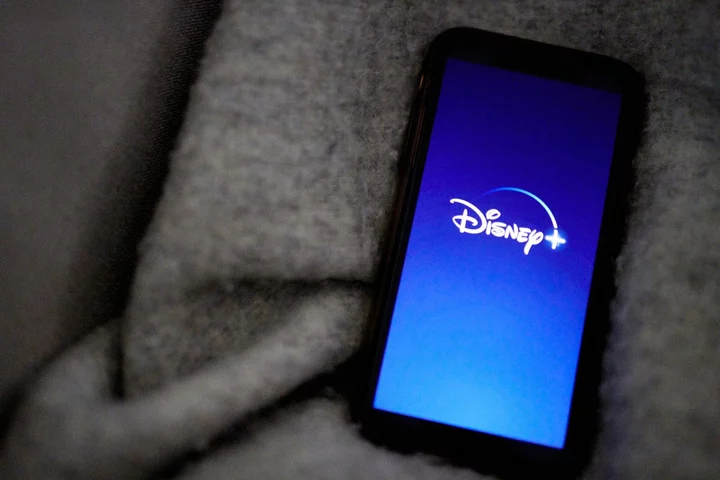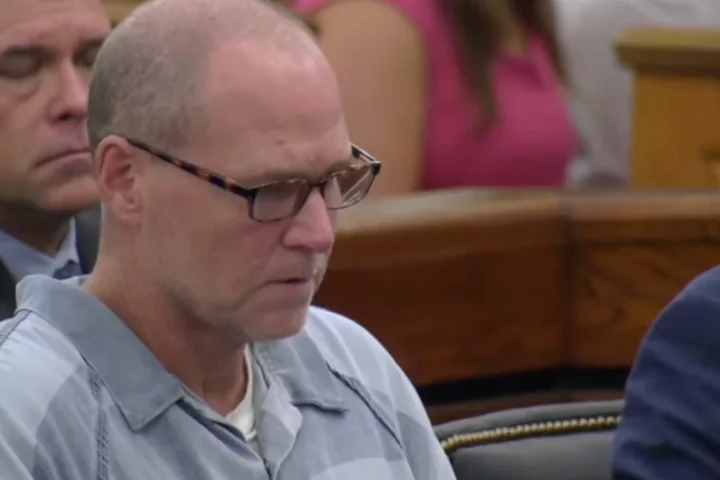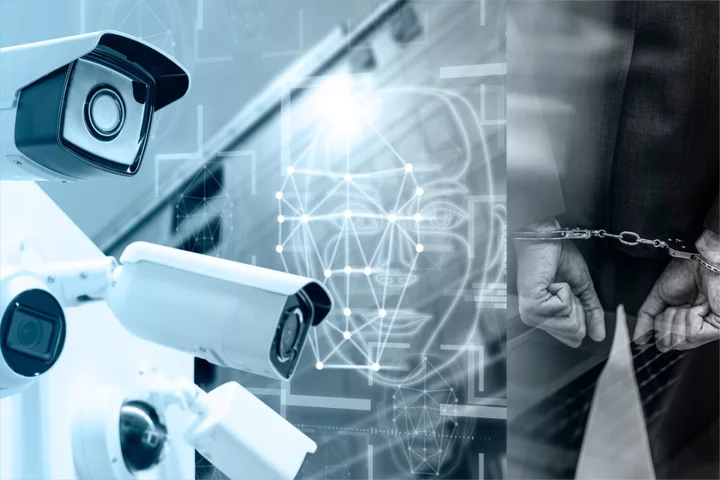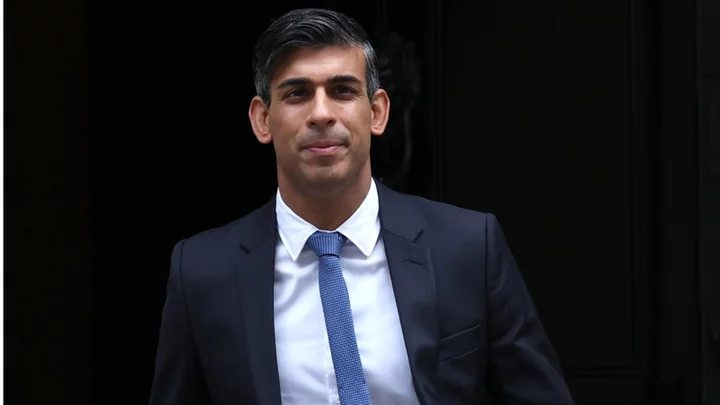
Disney to Cut Target for Disney+ Streaming Subscribers
Walt Disney Co. expects to fall tens of millions of subscribers short of its last publicly stated 2024
1970-01-01 08:00

Adobe Offers Tepid Sales Outlook Despite Growing AI Optimism
Adobe Inc. provided a sales outlook that met analysts’ expectations, but disappointed investors who expected demand for the
1970-01-01 08:00

Alex Murdaugh’s longtime friend and alleged accomplice is sentenced to 10 years for financial fraud crimes
Former attorney Corey Fleming was sentenced to 10 years in prison on charges that he conspired with his longtime friend Alex Murdaugh to steal millions of dollars from trusting clients. Fleming previously pleaded guilty to the financial fraud charges that stem from Murdaugh’s alleged scheme to steal money from the estate of his dead housekeeper Gloria Satterfield. Satterfield died in a fall on the Murdaugh property in 2018. He was also involved in stealing money from the family of Hakeem Pinckney – a man whose family Murdaugh represented after he was killed in a car crash in 2009. While Fleming knew Murdaugh was asking him to do wrong, he previously said he didn’t realise the depth of his old friend’s depravity. The sentencing was handed down on the same day Fleming’s longtime friend Murdaugh appeared in court for his own hearing on financial fraud charges for the first time since he was sentenced to life in prison in the murders of of his wife Maggie and son Paul. Judge Clifton Newman set a trial date for 27 November. On 15 August, Fleming pleaded guilty to federal conspiracy charges and was sentenced to nearly four years (46 months) in federal prison. He is housed at the Charleston County jail awaiting a prison assignment. On 23 August, he pleaded guilty to all state charges. Judge Newman scheduled Fleming’s sentencing for today in Beaufort so that the court could hear from friends and family members, as well as victims. At the hearing on Thursday, prosecutor Creighton Waters urged the judge to not be fooled by Fleming’s claims that he was “recruited” by Murdaugh into stealing from the families of Satterfield and Pinckney. Mr Waters argued that Fleming, who was an attorney at the time, was hired to represent the families but then “behind the scenes colluded with the defendant”. “What Mr Fleming wants the court to believe is… that he was tricked and fooled by Mr Murdaugh like everyone else,” Mr Waters said. The prosecutor then pointed to the fake Forge scheme in which Murdaugh allegedly set up a firm called Forge - a fake company with the name of a real one, which was used to siphon off money from clients. Murduagh and Fleming are accused of securing payouts from insurance companies in Satterfield’s case and then sending nearly $4m in stolen money to the fake company. “It was a shakedown, plain and simple,” Mr Waters said of Fleming and Murdaugh’s treatment of the Satterfield family. At the hearing on Thursday, several people addressed the court on behalf of the victims. Tony Satterfield, the son of Gloria Satterfield, told the court, “I still forgive Mr Fleming.” Satterfield’s sister also addressed the court and said that the family forgives Fleming. “Gloria did not die in vain as her case brought out other corruption and dishonest misdeeds being done to others,” she said, adding that it brought corruption “to light”. Attorney Eric Bland, who represents the Satterfield family, spoke at the hearing and said the law profession is “stained” by Fleming’s crimes. Fleming surrendered his license to practice law in both Georgia and South Carolina, saying he dishonored the profession. “The profession we love has been stained,” he said. “Mr Fleming knew exactly what he was doing. He is a plaintiff lawyer... it is impossible.” He said the debacle involving Murdaugh, Fleming and Laffitte, has “stained our state.” Mr Bland said the judge and court will hear how Fleming is a good guy, but that “good guys can still do criminal things.” “I’ve been suing other lawyers for 30 years. Never seen a case where the lawyers took every single dollar. But that’s what Fleming and Murdaugh did. Every single dollar.” Mr Bland also went over several examples of violations and irregularities in how Fleming handled and filed the Satterfield case to show the depth of the conspiracy and the criminal behaviour. He says Fleming and Murdaugh sat on the $4.3m settlements knowing that Gloria Satterfield’s son Brian, a vulnerable adult, was being put out on the street because his mom’s trailer was being foreclosed on. Mr Bland called it “blatant thievery”. Fleming is the second Murdaugh associate ordered to prison since investigators began scrutinising every aspect of Murdaugh’s life in June 2021 after his wife and son were shot to death at their South Carolina home. Russell Laffitte, who was convicted of federal charges in November, appeared for a status conference on Thursday in his state case. One of his attorneys, South Carolina State Rep Todd Rutherford, asked the judge to delay a trial until the fall of 2024. Judge Newman said that he would make a ruling at a later date. Last month, Laffitte was sentenced to seven years in prison after pleading guilty to helping Murdaugh steal money from settlements for clients after vehicle wrecks or work injuries. Laffitte is appealing his conviction and sentence. Read More Smiling Alex Murdaugh appears in court in shackles as trial date set in financial fraud case Outrage as South Carolina lawmaker stands to shake hands with convicted killer Alex Murdaugh in court Alex Murdaugh’s friend pleads guilty to helping steal from dead maid’s family
1970-01-01 08:00

San Francisco Loses Tech Firm to Miami After $10 Billion Buyout
Anaplan Inc. is moving its headquarters to Miami after more than a decade in San Francisco, marking a
1970-01-01 08:00

Wrongly arrested because of facial recognition: Why new police tech risks serious miscarriages of justice
On 16 February, Porcha Woodruff was helping her children get ready for school when six Detroit police officers arrived at her door. They told her she was under arrest for a January carjacking and robbery. She was so shocked she wondered for a moment if she was being pranked. She was eight months into a difficult pregnancy and partway through a nursing school programme. She did little else besides study and take care of her kids. She certainly wasn’t out stealing cars at gunpoint, she said. “I’m like, ‘What,?’ I opened my door so he could see my stomach. ‘I’m eight months pregnant. You can see two vehicles in the driveway. Why would I carjack?’” she told The Independent. “‘You’ve gotta be wrong. You can’t have the right person.’” Her children cried as she asked officers if the suspect was pregnant and insisted they had mistakenly arrested her. She was put in handcuffs and taken to jail, where she had panic attacks and early contractions. She later learned police identified her as a suspect after running security footage through the department’s facial recognition software, relying on a 2015 mugshot from a past traffic arrest into a photo lineup where the carjacking victim singled out Ms Woodruff as her assailant. The Detroit Police Department eventually dropped the case, but the arrest has deeply shaken Ms Woodruff. “What happened to the questioning? What happened to me speaking to someone?” she said. “What happened to any of the initial steps that I thought were available to a person who was accused of doing something?” The case underscores the growing risks of civil rights violations as police departments and law enforcement agencies across the country increasingly adopt facial-recognition and other mass surveillance technologies, often used as an unreliable shortcut around methodical human police work. Criminal justice advocates and the people targeted by this burgeoning police tech argue these programmes are riddled with the same biases and opaque or nonexistent oversight measures plaguing policing at large. The early results, at least, haven’t been encouraging. At least six people around the US have been falsely arrested using facial ID technology. All of them are Black. These misfires haven’t stopped the technology from proliferating across the country. At least half of federal law enforcement agencies with officers and a quarter of state and local agencies are using it. “We have no idea how often facial recognition is getting it wrong,” Albert Fox Cahn, executive director of the Surveillance Technology Oversight Project (STOP), told The Independent. “When you have facial recognition being used thousands of times, without any accountability for mistakes, it’s inviting injustice,” he added. Nowhere has that injustice been more pronounced than Detroit, a city where Black people have long experienced documented over-policing from law enforcement. Three of the six people mistakenly arrested by facial recognition technology have been in the Motor City, according to the ACLU. This status quo is why Ms Woodruff is suing DPD, claiming among other things that the agency has engaged in “a pattern of racial discrimination” against her and other Black residents “by using facial recognition technology practices proven to misidentify Black citizens at a higher rate than others in violation of the equal protection guaranteed by” the Michigan civil rights statutes. “I definitely believe that situation would’ve gone differently had it been another race, honestly, just my opinion. There was no remorse shown to me and I was pregnant. I pleaded,” she told The Independent. “Being mistaken for something as serious as that crime – carjacking and armed robbery – that could’ve put me in a whole different type of lifestyle,” she added. “I was in school for nursing. Felons cannot become nurses. I could’ve ended up in jail. That could have altered my life tremendously.” The Independent has requested comment from DPD. After Ms Woodruff filed her suit, Detroit police chief James White said in a press conference in August “poor investigative work” led to the false arrest, not facial recognition technology. He claimed that department software gave detectives numerous possible suspects and was only meant to be a “launch” point for further investigation. “What this is, is very, very poor investigative work that led to a number of inappropriate decisions being made along the lines of the investigation, and that’s something this team is committed to not only correcting, having accountability, having transparency with this community, and in building policy immediately to ensure regardless of the tool being used, this never happens,” Mr White said. He added that officers won’t be allowed to use images sourced by facial recognition in lineups, and warrants based on facial ID matches must be reviewed by two captains before being carried out. ‘The lead and the conclusion’ Some aren’t convinced these changes will prevent the excesses of what they see as a fundamentally flawed technology. “The technology is flawed. It’s inaccurate,” Philip Mayor, senior staff attorney at the ACLU of Michigan, told The Independent. “Police repeatedly assured us that it’s being used only as an investigative lead, but what we see here in Detroit time and time again is it is both being used as the lead and the conclusion.” Studies suggest that facial-recognition algorithms, which have been used to capture suspects in high-profile cases like those connected to January 6, also fail to accurately identify Black people and women, driving up inequalities in arrests, because image-training datasets often lack full diversity. However, according to Mr Mayor, police departments make things even worse by failing to do basic training and common-sense investigative work on top of facial recognition tools. He represents Robert Williams, a Detroit man who was mistakenly arrested for a 2020 theft from a high-end Detroit boutique. A security contractor employed by the store worked with the city and state police and flagged Mr Williams’ name using facial recognition tools. How police came to trust that Williams was the right man reveals the sloppiness of how facial ID tech is used in practice, according to the ACLU attorney. After the theft, police searched a database containing both past photos of Mr Williams and his present-day driver’s license. ‘It picks out 486 people who are the most likely perpetrators; not a single one of them is his current driver’s license, even though his current driver’s license is in the database that was searched,’’ Mr Mayor said. “That seems like an obvious exculpatory fact, the kind of thing that would lead you to say if you were actually thinking, this isn’t the right guy.” When these dubious matches are then used to build a line-up, questionable police work attains the gloss of near-fact, and witnesses choose from a group of people who may have no credible tie to a crime that took place but still look something like the person who did. “This is not me,” Mr Williams told police during his investigation, according to The New York Times. “You think all Black men look alike?” The father of two, after asking a local police voluntarily stop using facial recognition technology, sued the DPD in 2021. “This technology is dangerous when it doesn’t work, which is what the cases in Detroit are about. It’s even more dangerous when it does work. It can be used to systematically surveillance when we come and go from every one of the places that are important in our private lives,” the ACLU attorney said. “I don’t think there’s any reason to believe that departments elsewhere right now are not making the same mistakes.” ‘A force multiplier for police racism’ Detroit isn’t the only place grappling with the impacts – and errors – of this technology. In Louisiana, the use of facial recognition technology led to a wrongful arrest of a Georgia man for a string of purse thefts. A man in Baltimore spent nine days in jail after police incorrectly identified him as a match to a suspect who assaulted a bus driver. The Baltimore Police Department ran nearly 800 facial recognition searches last year. Those cases and others have added to a growing list of misidentified suspects in a new era of racial profiling dragnets fuelled by tech that is rapidly outpacing police and lawmakers’ ability to fix it. Facial recognition software often is “a force multiplier for police racism,” worsening racial disparities and amplifying existing biases, according to Mr Cahn. It can spur a vicious cycle. Black and brown people are already arrested at disproportionate rates. These arrests mean they are more likely to enter a database of faces being analyzed and used for police investigations. Then, error-prone facial recognition technology is used to comb these databases, often failing to identify or distinguish between Black and brown people, particularly Black women. “So the algorithms are biased, but that’s just the start, not the end of the injustice,” Mr Cahn says. Such technologies, advocates warn, are embedded in wider mass surveillance programmes that often lack robust public oversight. In New York City, law enforcement agencies relied on facial recognition technology in at least 22,000 cases between 2016 and 2019, according to Amnesty International. New York City’s Police Department spent nearly $3bn growing its surveillance operations and adding new technology between 2007 and 2019, including roughly $400m for the Domain Awareness System, built in partnership with Microsoft to collect footage from tens of thousands of cameras throughout the city, according to an analysis from STOP and the Legal Aid Society. The NYPD has failed to comply with public disclosure requirements about what those contracts – from facial recognition software to drones and license plate readers – actually include, according to the report. Until 2020, that money was listed under “special expenses” in the police budget until passage of the Public Oversight of Surveillance Technology Act. The following year, more than $277m in budget items were listed under that special expenses programme, the report found. “We’ve seen just concerted pushback from police departments against the sort of oversight that every other type of government agency has because they don’t want to be held accountable,” according to Mr Cahn. “If we treated surveillance technology vendors the way we treated other technology vendors, it would be like Theranos – police would be arresting some of these vendors for fraud rather than giving them government contracts,” he added. “But there is no accountability.” On 7 August, 2020, New York City Police Department officers in riot gear launched a six-hour siege outside Derrick Ingram’s Hell’s Kitchen apartment. Mr Ingram – a racial justice organiser who is embroiled in a federal lawsuit against the NYPD – was surrounded by more than 50 officers after he allegedly shouted into an officer’s ear at a protest earlier that summer. Police insisted they had a warrant on assault charges, but couldn’t produce one when Mr Ingram asked them to, according to his suit. The whole encounter, in which the NYPD deployed snipers, drones, helicopters, and police dogs, began with facial recognition technology. “To say that I was terrified is an understatement – I was traumatized, I still am,” Mr Ingram later testified. “I fear deep down in my core that if I opened my door to those officers, my life would be swiftly taken.” To identify Mr Ingram as a potential suspect, NYPD relied on facial recognition software “as a limited investigative tool, comparing a still image from a surveillance video to a pool of lawfully possessed arrest photos,” according to a police statement, adding that “no one has ever been arrested solely on the basis of a computer match.” The software pulls from a massive internal database of mugshots to generate possible matches, according to the department. Civil rights groups and lawmakers criticized the department’s use of facial recognition – initially hailed as a tool to crack down on violence offenders – for being deployed to suppress dissent, and triggering a potentially lethal police encounter at Mr Ingram’s home. As for Ms Woodruff in Detroit, she hopes her experience can show the dangers of relying too heavily on facial recognition technology. “It may be a good tool to use, but you have to do the investigative part of using that, too,” she said. “It’s just like everything else. You have your pieces that you put together to complete a puzzle.” Her life would’ve been a whole lot different, she said, if “someone would’ve just taken the time to say, ‘OK, stop, we’re going to check this out, let me make a phone call.’” Read More Detroit police changing facial-recognition policy after pregnant woman says she was wrongly charged White House science adviser calls for more safeguards against artificial intelligence risks How a Drake concert put NYPD’s ‘arsenal’ of surveillance technologies under the spotlight
1970-01-01 08:00

Morocco insists IMF, World Bank meetings to proceed in October
By Ahmed Eljechtimi and David Lawder MARRAKECH/WASHINGTON Morocco insisted on Thursday that Marrakech will host International Monetary Fund
1970-01-01 08:00

How to Unlock Apex Legends Fuse Heirloom
The Apex Legends Fuse Heirloom is an electric guitar called The Razor's Edge that fans get by unlocking all 24 cosmetics in the Harbingers Collection Event.
1970-01-01 08:00

Disney Holds Initial Talks on Sale of ABC to Local Broadcaster Nexstar
Walt Disney Co. has held exploratory talks about selling its ABC network and TV stations to local broadcaster
1970-01-01 08:00

Hunter Biden indicted on federal gun charges following special counsel probe
Federal prosecutors have indicted President Joe Biden’s son Hunter Biden on three charges stemming from allegedly false statements in the purchase of a firearm following a special counsel investigation. The indictment – the first ever against a sitting president’s son – follows a failed plea agreement on tax and gun charges that collapsed in July under scrutiny from a federal judge. Charges announced on 14 September follow a multi-year investigation from David Weiss, who was appointed by Donald Trump and remained as US attorney for Delaware under the current administration in an apparent effort to avoid the appearance of a conflict of interest. Mr Weiss, whose investigation preceded the Biden administration and Biden campaign, was appointed as special counsel in August. Hunter Biden was set to plead guilty to misdemeanour tax charges and enter a diversion agreement related to a felony gun charge in July, but the agreement appeared to hit a snag during a federal court hearing, and the judge presiding over the case ultimately rejected the arrangement. Congressional Republicans, meanwhile, continue to investigate the younger Biden and prepare an impeachment inquiry against the president, fuelled by GOP allegations that he was involved with and profited from his son’s business dealings. House Republicans have not provided any evidence that the president was influenced by or profited from such dealings while in office. A Delaware grand jury’s indictment charges Hunter Biden with illegally owning a gun as a drug user, and for allegedly lying on a form when he bought the firearm. The charges are expected to draw right-wing outrage and fuel Republican campaigns against the Biden family, as the frontrunner for the 2024 Republican nomination for president faces four criminal indictments spanning dozens of charges, including for crimes allegedly committed while in office. The day before the indictment was announced, attorneys for Hunter Biden sued a former Trump-era White House official accused of launching a “sustained, unhinged and obsessed campaign” against him and the Biden family, including hacking the alleged contents of a laptop that were central to political campaigns surrounding the 2020 presidential election, federal investigations and Republican-led congressional probes. This is a developing story Read More Why Trump’s DOJ could help Biden with House Republicans’ impeachment inquiry Hunter Biden sues former Trump aide tied to laptop hack Why do Republicans want to impeach Joe Biden?
1970-01-01 08:00

Dan Orlovsky Says Bills Must Have the Courage to Tell Josh Allen to Grow Up
Dan Orlovsky with strong words for the Bills and Josh Allen.
1970-01-01 08:00

China poses threat to UK way of life, says Rishi Sunak
The prime minister responds to a highly critical report on the UK's security response to China.
1970-01-01 08:00

Briton bemused after failing to find ‘vino’ at Rugby World Cup stadium in France
A Brit was left bemused after being told there was no “vino” for sale at a Rugby World Cup stadium in France. Linda Russ, 64, says women weren’t catered for at the Stade Vélodrome in Marseille - as only beer was available. The stadium is located in the historic French province of Provence, which is famous for its wines. But Linda claims the irony was missed by staff - who she says stared back at her with a blank expression and said “non” when she asked for a glass. She was in the south of France with a group of friends to watch England and Scotland’s first games over the weekend. Linda, a retired school operations manager from Bristol, said: “Being in Provence, you would have thought they’d have wine. “The restaurants nearby had it, but there was none in the stadium. It was strange. “There were no alcoholic drinks at the Vélodrome for women. The only alcoholic drink available was beer and it ran out on both days before the match started. “We asked for wine and they said no. “We always go to the Bristol Bears rugby back home. It’s usually always cider or wine for the girls. “I think they just weren’t equipped to deal with rugby fans. “The people serving were so young, we asked for “vino” and they couldn’t understand us at all.” Wine is thought to have been made in Provence for at least 2,600 years, ever since the ancient Greeks founded the city of Marseille in 600 BC. And France and wine are synonymous the world over. Linda, who often goes to rugby games with family and friends, says she enjoys a drink while watching. She said: “We were thinking they may not have cider, which is what we normally have as we’re from Bristol. “We even tried ordering vino blanc and vino rouge, but they didn’t understand us at all!” Linda says the beer that was available quickly ran out too - which she views as a man’s drink. She said: “It was very strange that there seemed to only be alcohol for the men and not for the women. “We also noticed the toilets didn’t stock up on paper towels from the previous night in the women’s toilets. “It was really poor preparation - they were completely overwhelmed.” Asked how the stadium should better prepare for games, Linda said: “Get some wine in, get more beer in, and be more prepared.” “They’ve got to realise us rugby fans drink a lot.” The Stade Vélodrome and World Rugby were approached for comment. Read More Warning to Brits who dined at popular French restaurant after woman dies during botulism outbreak Chorus of disapproval: National anthems sung by schoolkids at Rugby World Cup out of tune with teams France sends the army to ensure water to drought-stricken Indian Ocean island of Mayotte Russia-Ukraine war: Kyiv ‘retakes village near Bakhmut’ after Crimea strikes - live Russian pilot tries to shoot down RAF spy plane: ‘You have the target’ Analysis: What we learnt from Vladimir Putin’s summit with Kim Jong-un in Russia
1970-01-01 08:00
